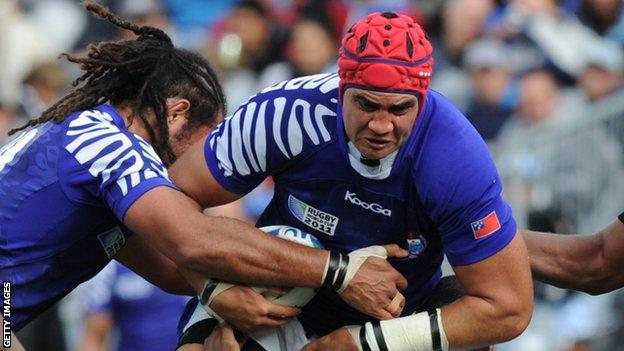Rugby World Cup 2019: Pacific Islands discuss boycott over World League plan
Last updated on .From the section Rugby Union

Pacific Island nations are considering a boycott of this year's Rugby World Cup in protest at plans to revamp the international Test calendar.
A World Rugby proposal suggests creating a 12-team World League from 2020 - with nations such as Samoa, Fiji and Tonga potentially not included.
Pacific Rugby Players' Welfare wants its 600 members to discuss the boycott.
"Now is the time for the voice of Pacific rugby to be heard through our players," said the PRPW's Daniel Leo.
The former Samoa lock added that the call for a boycott was "a legitimate player protest" at World Rugby's reported plans.
World Rugby sources have told BBC Sport the plans - which have not been finalised - would not exclude Pacific Islands nations, and that promotion to and relegation from the World League was likely.
However, Leo said it should now be "abundantly clear that World Rugby has failed the genuine rugby fan" and called on the three Pacific national unions to support their players' move to help "head off this calamity".
Fiji, Samoa and Tonga have all qualified for the World Cup in Japan, which starts on 20 September.
"The days of colonialism are long behind us but this model that they're proposing is more reminiscent of those days," Leo, who represented Samoa at the 2007 and 2011 World Cups, told BBC Sport.
"We want to be known as a progressive sport - one that's inclusive, one that allows sides to be promoted and allows sides to have equal opportunity - but the signs are a bit ominous.
"Everyone plays this game to progress and if there's a ceiling to how well you can do in this game then smaller nations probably just shouldn't play in the first place. I feel we're at a real crossroads in the sport."
Speaking on BBC Radio 5 live's Friday Sports Panel, former England head coach Stuart Lancaster said he had "100% sympathy" for the Pacific Islands.
"If you think of the number of players who come from the Pacific Islands and play rugby across the world, if anything we should be doing everything in our power to help them not to hinder them," he said.
"I don't know how it will all play out but with the reaction to date, particularly from the players and this notion of no promotion and relegation and 12 countries included and everyone else excluded - it doesn't make any sense. And I'd be very surprised if it got much traction."
Bristol Bears head coach Pat Lam, who played in three World Cups for Samoa, told BT Sport the plans were a "real slap in the face" for the Pacific Island nations.
"It's shocking. The Pacific Islanders, what they've brought through, and their influence around the world, is huge," he said.
Analysis
BBC Sport's Sara Orchard
World Rugby is struggling to keep its World League plans afloat. In the space of a few days, attempts to drown it have been coming from port and starboard.
First, player welfare issues were raised by some of the biggest names in rugby union including England captain Owen Farrell and New Zealand skipper Kieran Read. Now the Pacific Islands players will have their say on any plans that involve their exclusion and have threatened to boycott the fast approaching World Cup in Japan.
Anyone who's watched the film 'Pacific Warriors' knows what Tonga, Fiji and Samoa mean to rugby union, but also what they have sacrificed and still do.
Since the game went professional in 1995, the islands have been powerless to stop players switching their allegiance to clubs in Tier One nations. The vast sums of money offered in return for forfeiting any international ambitions for the country of their birth mean it still goes on today.
You can't blame the players; a rugby career is short. If the Pacific Islands are completely removed from the top level of the World League's plans for 12 years it could further fuel their player drain. It would be a fate that few in rugby union would feel comfortable about.






























Comments
Join the conversation
Shame on those who are pushing for this .
All top teams around the world exploiting south sea islanders ,
How many times in the past have top clubs failed to release these players to play for there country,
now there sending a message they don’t want there countries involvement in this world league.
It’s wrong wrong wrong .
Go Pacific behined you 100%
Those selected have obviously been based on 2 basis:-
1. The traditional rugby nations
2. Make the rest up from the sides with the biggest potential TV audience
Excluding the PI nations, and Georgia seems fairly off.
The islanders should be a part of the World League, though. Although small in population, they bring so much to Rugby. It can’t all be about money.
In their whole history the All Blacks have played these teams just 17 times. Put in context the ABs have played the Lions 41 times and the Lions only tour NZ every 12 years!
If their nearest neighbour ignores them is it any wonder world rugby is as well?
Would rather watch a combined Pacific islands in 6n than turgid italy
These people who see rugby as a business and cannot countenance relegation because it damages their business have no strategic vision: if the quality suffers and it's seen as an insular sport played by only a few then no-one will be interested in watching. End of business.
FIFA, for all their flaws, understand that and made football a global game .
Stand up and be counted!
Most of the Pacific islands team are better than Scotland, and Italy...